七年级英语不规则的动词的过去式
初中英语不规则动词的过去式和过去分词
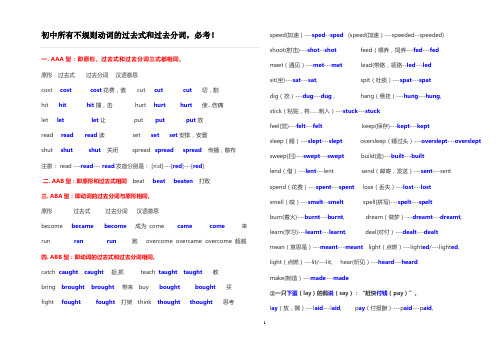
初中所有不规则动词的过去式和过去分词,必考!一. AAA型:即原形、过去式和过去分词三式都相同。
原形过去式过去分词汉语意思cost cost cost花费,值cut cut cut 切,割hit hit hit撞,击hurt hurt hurt使…伤痛let let let让put put put放read read read读set set set安排,安置shut shut shut 关闭spread spread spread 传播,散布注意: read ---read--- read发音分别是: [ri:d]---[red]---[red]二. AAB型:即原形和过去式相同beat beat beaten打败三. ABA型:即动词的过去分词与原形相同。
原形过去式过去分词汉语意思become became become成为come came come来run ran run跑overcome overcame overcome 超越四. ABB型:即动词的过去式和过去分词相同。
catch caught caught捉,抓teach taught taught教bring brought brought带来buy bought bought买fight fought fought打架think thought thought思考speed(加速)---sped--sped(speed(加速)---speeded--speeded)shoot(射击)---shot--shot feed(喂养,饲养---fed---fedmeet(遇见)---met---met lead(带路,领路--led---ledsit(坐)---sat---sat, spit(吐痰)---spat---spatdig(挖)---dug---dug , hang(悬挂)---hung---hung,stick(粘贴,将……刺入)---stuck---stuckfeel(觉)---felt---felt keep(保存)---kept---keptsleep(睡)---slept---slept oversleep(睡过头)---overslept---overslept sweep(扫)---swept---swept build(造)---built---builtlend(借)---lent---lent send(邮寄,发送)---sent---sentspend(花费)---spent---spent lose(丢失)---lost---lostsmell(嗅)---smelt--smelt spell(拼写)---spelt---speltburn(着火)---burnt---burnt, dream(做梦)---dreamt---dreamt,learn(学习)---learnt---learnt, deal(对付)---dealt---dealtmean(意思是)---meant---meant light(点燃)---light ed/---light ed,light(点燃)---lit/---lit, hear(听见)---heard---heardmake(制造)---made---made②一只下蛋(lay)的鹅说(say):“赶快付钱(pay)”。
七年级英语不规则动词过去式
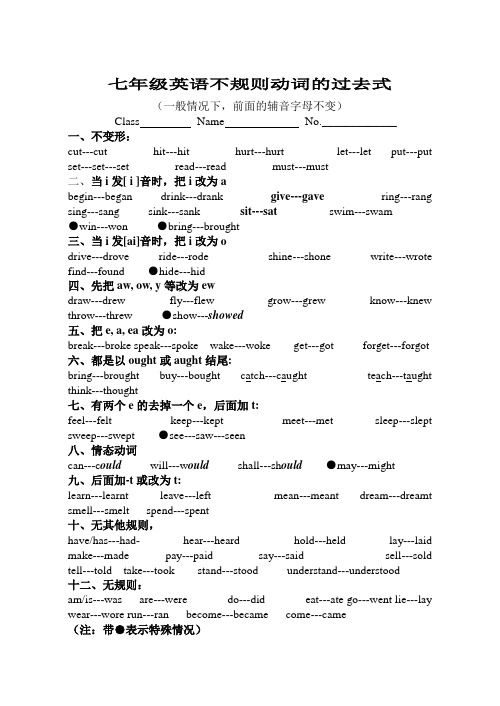
七年级英语不规则动词的过去式(一般情况下,前面的辅音字母不变)Class Name No._____________一、不变形:cut---cut hit---hit hurt---hurt let---let put---put set---set---set read---read must---must二、当i发[ i ]音时,把i改为abegin---began drink---drank give---gave ring---rang sing---sang sink---sank sit---sat swim---swam●win---won ●bring---brought三、当i发[ai]音时,把i改为odrive---drove ride---rode shine---shone write---wrote find---found ●hide---hid四、先把aw, ow, y等改为ewdraw---drew fly---flew grow---grew know---knew throw---threw ●show---showed五、把e, a, ea改为o:break---broke speak---spoke wake---woke get---got forget---forgot 六、都是以ought或aught结尾:bring---brought buy---bought catch---caught teach---taught think---thought七、有两个e的去掉一个e,后面加t:feel---felt keep---kept meet---met sleep---slept sweep---swept ●see---saw---seen八、情态动词can---c ould will---w ould shall---sh ould●may---might九、后面加-t或改为t:learn---learnt leave---left mean---meant dream---dreamt smell---smelt spend---spent十、无其他规则,have/has---had- hear---heard hold---held lay---laid make---made pay---paid say---said sell---sold tell---told take---took stand---stood understand---understood十二、无规则:am/is---was are---were do---did eat---ate go---went lie---lay wear---wore run---ran become---became come---came(注:带●表示特殊情况)。
七年级动词过去式的不规则表

七年级动词过去式的不规则表1 A A2 --oughtcost cost bring broughtcut cut fight foughtfit fit think thoughthit hit buy boughthurt hurt 3--aughtlet let teach taughtput put catch caughtread read4 i--------a 5i-----o 6 aw/ow ---ewbegin began drive drove blow blewdrink drank ride rode draw drewgive gave write wrote grow grewring rang shine shone know knewsing sang win won throw threwsit sat fly flewswim swam7 ay---aid 8 ell---old 9 n---ntpay paid sell sold burn burntsay said tell told learn learntmean meant10 ee---e..+t 11 d---tfeel felt build builtkeep kept lend lentsleep slept send sentsweep swept 12feed fed come camemeet met become becamespeed sped can could shall shouldsmell smelt will wouldspell spelt do dideat atefall fellfind foundget gotforget forgotgo wenthave had hear heardhold held leave leftlose lost make madetake took mistake mistookstand stood understand understoodsee saw wake woke初中英语语法名词一可数名词1.单数形式常用a或者an来表示,a后接辅音音素而an后接元音音素.a book a pencil a ruler an apple an egg an ideaan old an unhappy boy a useful book an hour an honest boyan “A” “E”“F”“H”“I”“L”“M”“N”“O”“R”“S”“X”2.复数形式有规则变化和不规则变化规则变化有以下几条:(1)一般情况下在单数名词后直接加sa book two books(2)在以s,x,sh,ch字母结尾的单词后加esbus---buses box---boxes brush---brushes watch---watches(3)辅音字母加y结尾的词,把y改成ies,但元音字母加y的词则直接在单词后加s. baby—babies boy---boys(4)以f或fe结尾的词,把f或fe改成vesleaf---leaves knife---knives(5)以o结尾的词一般在单词后直接加s,但下列词要加eshero---heroes patato---patatoes tamato---tamatoes(6)复合名词的复数只要把最后一个名词变成复数就可以,但含有man/woman的复合名词,则两个名词都要变成复数.an apple tree------three apple treesa man teacher-----five men teachers不规则变化1 a—e man---men woman---women Frenchman--Frenchmen2 oo—ee foot---feet goose---geese tooth---teeth3单复数同形,注意这些词是可数名词people—people sheep---sheep deer---deer Chinese,English,Japanese4.child---children mouse---mice不可数名词1.肉类2.液体3调料4平时要多积累不可数名词有以下特点1.它没有单复数2 表示具体数量常用of结构a cup of tea a piece of news a bottle of milktwo cups of tea three bottles of milka box of apples five boxes of apples名词的修饰1.下列词修饰可数名词many许多a few有一些few很少,几乎没有,这些词后跟可数名词复数many books a few peoplefew apples2.下列词修饰不可数名词much 许多a little有一些little很少,几乎没有much milk a little water3.下列词既可以修饰可数名词复数又可以修饰不可数名词 alot of ,lots of ,plenty of ,some很多,一些a lot of apples andmilk4.orange room time名词所有格---的1.一般情况下在名词后加’s . Lucy---Lucy’s2.以s结尾的词加’.Teachers’ Day3.共同拥有的只要在最后一个词加’s后接单数名词.Lucy and Lily’s d esk而各自拥有的,则要在两个后都要加’s后接名词的复数Lucy’s and Lily’s desks4.of---的结构a map of China5.to--的结构the answer to the question ,the key to the door, a ticket to the movie6.双重所有格a friend of mine a book of my father’s冠词冠词分为不定冠词(a,an)和定冠词the下列情况下要用定冠词the1.表示特定的人或物.The girl under the tree is Lucy.2.表示说话人与听话人都熟悉的人或物.Lily is in the classroom.3.上文提到过的人或物.He gave me a book.The book is very good.4.表示世上独一无二的事物.the sun,the earth ,the moon5.普通名词构成的专有名词前.the Great Wall the Yellow River6.用在序数词,形容词的最高级和表示方位的名词前.the first ,the biggest,in theeast/south/west/north7.用在乐器名词前play the piano,play the violin8.用在姓名复数形式前,指一家人the Greens9.the加形容词表示一类人the poor the rich下列情况下不用冠词1.在有些专有名词前China2.名词前有作定语的限定词,如this,my,no,any,some This is my cat.3.季节月份星期及三餐前不用冠词.in spring ,on Sunday, have supper4.球类运动,棋类游戏前play soccer, play chess5.节日名词前May Day ,Children’s Day6.称呼语头衔或职务前Mr Green代词I we you he she it they 主格me us you him her it them 宾格我我们你,你们他她它(他她它)们my our your his her its their加名词my bookmine ours yours his hers its theirs不加名词我的我们的你(们)的他的她的它的(他.她,它)们的myself ourselves yourself/yourselves himself herself itself themselves我自己我们自己你(们)自己他自己她自己它自己(他.她,它)们自己1.主格作主语I am from China.2.宾格作宾语动词+宾格=动宾结构give me a book teach us English3.介词+宾格=介宾结构give this book to her It’s very kind of him to help us.4.enjoy oneself=have a good time learn by oneself=teach oneselflook after oneself=take care of oneself Help oneself (yourself/yourselves)to…by oneself say to oneself数词1.基数词和序数词one first six sixth eleven eleventhtwo second seven seventh twelve twelfththree third eight eighth twenty twentiethfour fourth nine ninth twenty-one twenty-firstfive fifth ten tenth2.分数=分子/分母分子用基数词,分母用序数词;当分子大于1,分母要用复数形式.1/3 one third 1/5 one fifth 1/2 a half 1/4 a quarter 2/3 two thirds 5/7 five sevenths3.dozen,hundred,thousand,million,billon的用法,如果这些词前有基数词或several,不能用复数形式;如果没有基数词或several,则这些词要用复数形式而且还要加上of.two dozen books , several hundred cars ,thousands of people4.时间表达方式0~30 分钟past 时钟30~60 分钟to下一个钟点o’clock整点1:10 ten past one 1:40 twenty to two 2:00two o’clock2:15 a quarter past two 2:45 a quarter to three3:30 a half past three 3:55 five to four5.编号Lesson One=the first lesson Room205 Class3,Grade7in the 1950s =in the nineteen fifties 在二十世纪五十年代in one’s twenties/thirties6.four-year-old four years old 100-meter raceTom is a four-year-old boy. Tom is four years old.形容词和副词一.形容词…的clever interesting popular fat1.形容词的构成名词+ly =形容词名词+ y =形容词名词+al =形容词friend+ly=frienly fun+y=funny person+al=personallove+ly=lovely sun+y=sunny nation+al=nationallive+ly=lively cloud+y=cloudy education+al=educational名词+ful =形容词名词+less =形容词名词+en =形容词hope+ful=hopeful hope+less=hopeless wood+en=woodenuse+ful=useful use+less=useless wool+en=woolenbeauty+ful=beautiful help+less=helpless gold+en=golden名词+ous=形容词动词+able=形容词danger+ous=dangerous change+able=changeablesafety safe count+able=countablecomfort+able=comfortable2.形容词的用法形容词+名词作定语系动词+形容词=系表结构作表语good boy be/look/sound/feel/smell/taste/become angry形容词作宾语的补足语keep the room clean二.副词…..地hard slowly1.副词的构成形容词+ly=副词slow+ly=slowly heavy+ly=heavilyhard,fast既是形容词又是副词hardly2副词的用法副词用来修饰动词run quicklygood taste good a good boy well sell well三形容词和副词的比较级和最高级的构成规则变化1.一般情况下在形容词和副词后加er,estclean---cleaner---cleanest2.辅音字母加y结尾的词把y改成ier,iestheavy---heavier---heaviest3.以辅音字母结尾的重读闭音节形容词双写最后一个辅音字母再加er,est big—bigger---biggest fat---fatter---fattest thin ,hot, wet4.部分双音节词和多音节词,在这些词前加more,mostpopular---more popular ---most popular不规则变化good/well---better---best bad/badly---worse---worstlittle---less---least far—farther/further—farthest/furthestold---older/elder---oldest/eldest (兄弟姐妹之间比较)many/much---more---most at least 最少at most 最多less than 少于more than=over 大于,超过my elder brother 我的哥哥my eldest brother我的大哥farther更远further更进一步四.形容词副词原级比较级最高级的用法.1原级的用法(1)as….as 与…一样He is as tall as Tom. He is running as quickly as Tom.(2)not as/so….as=less than 前者不如后者Tom is not as/so tall as YaoMing.(3)very/rather/quite very beautiful(3)基数词times as…as 倍数确Tom is three times as fat as Jim.3.比较级的用法(1)两者之间进行比较,常有than提示Who is taller,Maria or Jane? Jack is fatter than Tom.(2)下列词后常用比较级much,no ,a litter,any ,even, still,farmuch bigger a litter taller much more beautiful(3)比较级and比较级越来越…..bigger and bigger more and more popular(4)the 比较级…,the比较级….The more,the better.(5)同一范围内的比较比较级than any other 名词单数He is taller than any other boy in his class.比较级than the other名词复数He is taller than the other boys in his class.Beijing is bigger than any city in Japan.(不同范围的比较)(6)隐含比较Could you speak more slowly?最高级的用法(1)三者或三者以上之间进行比较Who is the tallest,Tom,Jim or LiMing?Tom is the thinnest of all.(2)the 序数词+最高级The Yellow River is the second longest river in China.(3)one of the比较级/最高级+名词复数Beijing is one of the biggest cities in the world.Tom is one of the taller boys.动词一非谓语形式Ving形式1.Ving形式的构成(1)一般情况下在动词后直接加ing. Look--looking(2)以不发音的e结尾的词去e后加ing.have—having see—seeing lie---lying die---dyingtie---tying(3)以辅音字母结尾的重读闭音节词,要双写最后一个辅音字母后加ing. Swim---swimming put---puttingrun,sit,slap,begin,cut,shop2.下列词后要加ingconsider/finish/keep/enjoy/like/love/mind/practice/goavoid/allow/No/do some+Vinggo swimming do some shopping finish readingallow doing be allowed to do sth3.介词要加ingat/in/on/of/off/up/for/by/with/without/about/before/afterfrom/upI am good at swimming. Don’t give up learning English.4.下列词组后要加ingfeel like/be busy/be worth/have fun/can’t(couldn’t)help /look forward to/pay attention to/make a contribution to/stay up(late)/find great pleasure in/have (some/no)trouble/difficulty5.作主语Swimming is good for your health.Open the door,please.6.作定语修饰名词swimming pool developing country动词不定式(to do)1.ask/tell/want/would like/warn/help/advise/encourage/teach/expect/allow/suggest后要加sb(not)to do sth2.plan/decide/begin/would like/want/try/learn/promise/refusecontinue/can’t wait/take turns后要加to do sth3.adj/adv +enough to do Tom is old enough to go to school.4.something/anything/nothing+adj to doI have something important to tell you.5.It’s adj of/for sb to do sth.It’s very kind of you to help me.It’s very important for you to learn English well.6.find/think/believe it +adj to do sthI find it difficult to learn English well.7.表示目的Tom jumped into the river to save that boy.8.do a lot of homework------a lot of homework to dolive in a house-----------a house to live in9.what/where/how/which/when+to do sthwhat to do/how to do sthI don’t know what to do. I don’t know how to do it.10.be glad/happy/pleased/nice/sad/sorry to doI am sorry to hear that. Glad to meet you.11.try/do one’s best to do sth12.can’t/couldn’t afford to do sth不带to的不定式既动词原形1.Why not/why+否定+主语后加不带to的不定式既动词原形Why not see a doctor?Why don’t you see a doctor?2.had better/had better not后加不带to的不定式既动词原形You had better stay in bed. You’d better not go to s chool now.3.make/let后加不带to的不定式既动词原形be made to do sthThis story made us laugh. Let’s go swimming now.Make you monitor make you happy4.Will/Would you please(not) 后加不带to的不定式既动词原形综合各种形式1.stop to do sth stop doing sth2.forget to do sth forget doing sth3.remember to do sth remember doing sth4.see/saw/watch/hear/heard +sb/sth+doing/do sthI often see her play soccer on the playground.When I got home,I heard her singing this song.5.get/be used to doing be used to do sth used to do sth used to be There used to be6.prefer doing to doing prefer to do sth rather than do sthwould rather do sth than do sthI prefer swimming to skating.I prefer to stay at home rather than go out for a picnic.二情态动词1.情态动词后加动词原形.2.can can’t could be able toI can play the piano.会,能I can’t swim. 不会He can’t be YaoMing, he is in the USA now.不可能I could play the guitar when I was ten years old.过去能Could you tell me something about China?有礼貌地提问I am able to swim. I was able to play the piano when I was 6.I will be able to fly to the moon one day.be able to应用于任何时态3.may maybe may beMay I help you? 可以The book may be on your desk.可能句中Maybe the book is on your book. 可能句首副词maybe=perhaps4. mu st must be mustn’t needn’t =don’t/doesn’t have toYou must go to school on time.必须主观I have to stay at home because I have got a bad cold.不得不客观This bike must be LinTao’s, his name is on it.一定是Must I finish my homework now?Yes,you must. No,you nee dn’t./No ,you don’t have to .不必You mustn’t play soccer on the street.不准5.needn’t+v原形don’t/doesn’t need to do sth时态名称意思结构现在进行时现在正在发生的动作am/is/are +ving now/at this momentI am doing my homework now. Jane is swimming at the moment.(now,listen,look,at the moment)过去进行时过去某个时刻正在发生的动作was/were+ving at this time yesterday at nine last night I was playing soccer at this time yesterday. Kangkang was watching TV at nine last night.一般将来时将要发生的动作will+v原形am/is/are going to+v原形tomorrow/next(week)/this/in2050/in two daysWe are going to Beijing tomorrow. She will have a birthday party next Monday.go,come,leave等词用现在进行时表示将来tomorrow/next(week)/this/in2050We are leaving for Japan the day after tomorrow.The summer holidays are coming.一般过去时过去发生的事或动作式常有下列词提示ago,just now,last week yesterday,the day before yesterday ,2000 过去式/didn’t+ v原形was/wereI was in Beijing last year. He played soccer just now.He didn’t play soccer just now. They were in the park two hours ago.一般现在时经常性或习惯性的动作当主语是第三人称单数且是肯定句时,动词要用第三人称单数形式.第三人称单数形式的构成(1)一般情况下在动词后加s look----looks(2)辅音字母加y结尾的把y变ies study----studies(3)以s,x,sh,ch,o 结尾加es guess—guessesMaria goes to school at 7:00 every day.Maria doesn’t go to school at 7:00 every d ay.Does Maria go to school at 7:00 every day?I often play soccer after class. They usually walk to school.arrive in Tom will arrive in Beijing tomorrow.arrive at Tom will arrive at Shanghang tomorrow. arrive When will Yao arrive?get to get home/here/there Tom will get to Beijing tomorrow. reach Tom will reach Beijing tomorrow.spend sb spend……on sth/(in)doing sthI will spend two hours on my homework.I will spend two hours doing my homework.tak e It takes sb…..to do sthIt took me 500yuan to buy this jacket.cost sth cost sb ….This bike cost me 600yuan.pay sb pay (….)forI paid 600yuan for this bike.---How long may I keep this book?---You can keep it for/about three days.---How soon will Tom arrive in Beijing?---In two weeks.---How often do you go swimming?---Twice a week./Sometimes.How many How much How fartime in time on time all the timeat the same time It’s time to do sth/It’s time for sth What’s the time?=What time is it?once twice three times four timesnever seldom sometimes=at times often usually always every..。
七年级英语不规则动词过去式
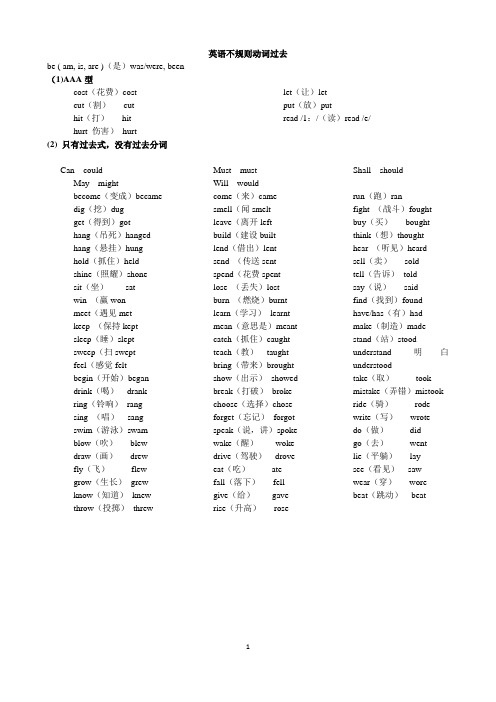
英语不规则动词过去be ( am, is, are )(是)was/were, been(1)AAA型cost(花费)cost cut(割)cut hit(打)hit hurt 伤害)hurt let(让)letput(放)putread /1:/(读)read /e/(2) 只有过去式,没有过去分词Can couldMay might Must mustWill wouldShall shouldbecome(变成)became come(来)came run(跑)randig(挖)dugget(得到)got hang(吊死)hanged hang(悬挂)hung hold(抓住)held shine(照耀)shone sit(坐)sat win (赢wonmeet(遇见met keep (保持kept sleep(睡)slept sweep(扫swept feel(感觉felt smell(闻smeltleave(离开leftbuild(建设builtlend(借出)lentsend (传送sentspend(花费spentlose (丢失)lostburn (燃烧)burntlearn(学习)learntmean(意思是)meantcatch(抓住)caughtteach(教)taughtbring(带来)broughtfight (战斗)foughtbuy(买)boughtthink(想)thoughthear (听见)heardsell(卖)soldtell(告诉)toldsay(说)saidfind(找到)foundhave/has(有)hadmake(制造)madestand(站)stoodunderstand明白understoodbegin(开始)began drink(喝)drank ring(铃响)rang sing (唱)sang swim(游泳)swam blow(吹)blew draw(画)drew fly(飞)flew grow(生长)grew know(知道)knew throw(投掷)threw show(出示)showedbreak(打破)brokechoose(选择)choseforget(忘记)forgotspeak(说,讲)spokewake(醒)wokedrive(驾驶)droveeat(吃)atefall(落下)fellgive(给)gaverise(升高)rosetake(取)tookmistake(弄错)mistookride(骑)rodewrite(写)wrotedo(做)didgo(去)wentlie(平躺)laysee(看见)sawwear(穿)worebeat(跳动)beat1。
初中英语过去式不规则变化表

初中英语过去式不规则变化表一、原形、过去式和过去分词的不规则变化1. 把动词原形中的o改为a,变成过去式。
过去分词则在原形动词的词尾加-d或-ed,但也有少数动词与此不同,如:成长(grow)为grew,过去分词是grown,发现(find)为found,过去分词是found。
2. 把动词原形中的i改为a,变成过去式。
例如:开始(begin) - began,访问(visit) - visited。
3. 把动词原形中的u改为o,变成过去式。
例如:找到(find) - found,读取(read) - read。
4. 把动词原形中的辅音字母d改为t,变成过去式。
例如:关闭(close) - closed,支付(pay) - paid。
5. 动词原形、过去式和过去分词完全相同。
例如:制造(make) - made,让(let) - let。
6. 动词原形、过去分词相同,但过去式不同。
例如:知道(know) - knew,过去分词是known。
7. 动词原形和过去式相同,但过去分词不同。
例如:放下(put) - put,过去分词是putted。
8. 动词原形、过去式和过去分词都不同。
例如:获得(get) - got,过去分词是got。
9. 动词原形有两个或更多形式。
例如:打(beat) - beat,过去式是beaten。
吃(eat) - ate,过去式是eaten。
二、口诀记忆一些单词的过去式和过去分词在变化规则上较为特殊,为了方便记忆,可以将它们编成口诀。
例如:“双写t,双改变”这个口诀指的是动词原形中字母t的双写情况,即把t改为d或把d改为t,同时改变动词的过去式和过去分词形式。
例如:单词double:动词原形double,过去式是doubled,过去分词是doubled。
单词swim:动词原形swim,过去式是swam,过去分词是swum。
单词write:动词原形write,过去式是wrote,过去分词是written。
初中英语不规则动词表--(看原形写过去式过去分词)
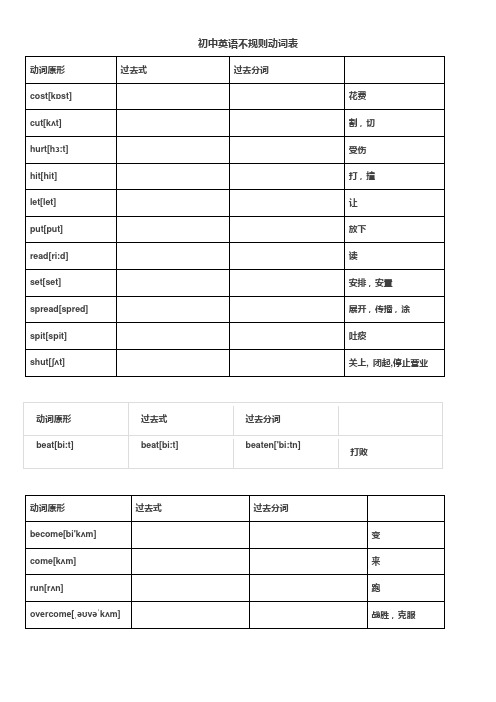
展示,给...看
smell[smel]
闻,嗅
speed[spi:d]
加速
spell[spel]
拼写
wake[weɪk]
醒来,叫醒,激发
(2)把动词原形的最后一个辅音字母“d”改为“t”构成过去式或过去分词。
动词原形
过去式
过去分词
build[bɪld]
建筑
lend[lend]
借给
send[send]
睡过头
(7)其它
动词原形
过去式
过去分词
lay[leɪ]
下蛋,放置
pay[peɪ]
付
say[seɪ]
说
stand[stænd]
站
understand[ʌndə'stænd]
理解,明白
lose[lu:z]
失去
have[hæv] [həv]
有
make[meɪk]
制造
sell[sel]
卖
tell[tel]
告诉
初中英语不规则动词表
动词原形
过去式
过去分词
cost[kɒst]
花费
cut[kʌt]
割,切
hurt[hɜ:t]
受伤
hit[hit]
打,撞
let[let]
让
put[put]
放下
read[ri:d]
读
set[set]
安排,安置
spread[spred]
展开,传播,涂
spit[spit]
吐痰
shut[ʃʌt]
spit[spɪt]
吐痰,
stick[sɪtk]
插进,刺入,粘住,
初中不规则动词过去式和过去分词表(附音标)
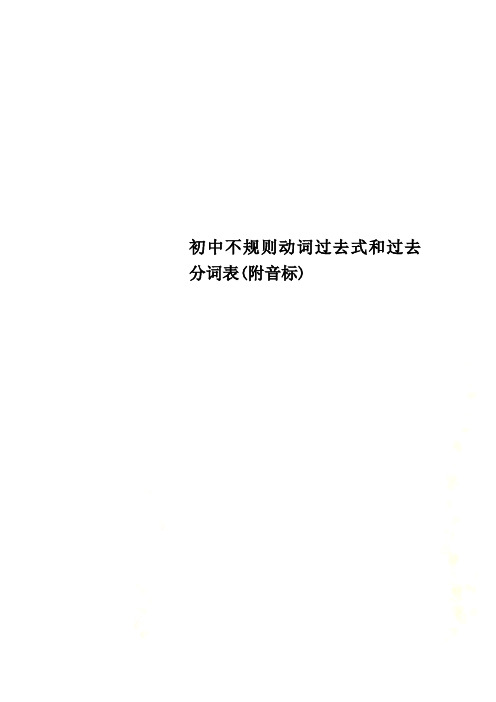
初中不规则动词过去式和过去分词表(附音标)
英语不规则动词记忆规律
虽然英语有些动词的过去式和过去分词变化不规则,但可以把这些不规则动词的变化成分几种形式来记忆:
1、AAA型(原形→原形→原形)
2、AAB型
3、ABA型(原形→过去式→原形)
4、ABB型
(1)、在动词原形后加一个辅音字母d, t或ed构成过去式或过去分词。
(2)、把动词原形的最后一个辅音字母“d”改为“t” 构成过去式或过去分词。
(3)、原形→ought →ought
(4)、原形→aught →aught
(5)、变其中一个元音字母
(6)、原形→□lt/pt/ft→□lt/pt/ft
(7)、其它(无规律)
5、ABC型
(1)、原形→ew→own
(2)、原形→过去式→原形+(e)n
(3)、原形→过去式→过去式+(e)n
(4)、变单词在重读音节中的元音字母“i”分别为“a”(过去式)和“u”(过
去分词),即[i→a →u]
(5)、其它(无规律)
6、一个动词有两种变化形式
7、情态动词(无过去分词)
后附:《初中英语不规则动词记忆表》
7.情态动词(无过去分词)。
初中英语常用不规则动词的过去式(读音)与过去分词、现在分词

初中英语常用不规则动词的过去式(读音)与过去分词、现在分词初中英语不规则动词的过去式与过去分词归纳一.过去分词词尾有字母-n1.过去分词由原形加-ne构成do-did-done go-went-gone2.过去分词由原形加-en构成beat-beat-beaten eat-ate-eaten fall-fell-fallen3.过去分词由原形加-n构成blow-blew-blown draw-drew-drawn drive-drove-driven give-gave-givengrow-grew-grown know-knew-known take-took-taken mistake-mistook-mistaken rise-rose-risen see-saw-seen show-showed-shown throw-threw-thrown4.过去分词由原形去字母e后,再双写后面的辅音字母加-en构成(*例外)hide-hid-hidden ride-rode-ridden write-wrote-written forget-forgot-forgotten*5.过去分词由过去式加-n构成break-broke-broken choose-chose-chosen freeze-froze-frozen speak-spoke-spokensteal-stole-stolen6.完全不规则形式am / is-was-been are-were-been fly-flew-flown lie-lay-lainwear-wore-worn二.过去式与过去分词形式相同bring-brought-brought build-built-built buy-bought-bought catch-caught-caught dig-dug-dug feel-felt-felt find-found-found get-got-gothave / has-had-had hold-held-held keep-kept-kept leave-left-leftlay-laid-laid lend-lent-lent lose-lost-lost pay-paid-paidhear-heard -heard make-made-made mean-meant-meant meet-met-metsay-said-said sell-sold-sold send-sent-sent sit-sat-satsleep-slept-slept smell-smelt-smelt spend-spent-spent spill-spilt-spiltspit-spat-spat spoil-spoilt-spoilt stand-stood-stood sweep-swept-sweptteach-taught-taught tell-told-told think-thought-thought win-won-wonunderstand-understood-understood wake-woke / waked-woken / wakedshine-shone / shined-shone / shined hang-hung / hanged-hung / hangedlearn-learnt / learned-learnt / learned三.原形、过去式与过去分词三种形式完全相同cost-cost-cost cut-cut-cut hit-hit-hit hurt-hurt-hurtlet-let-let put-put-put set-set-set shut-shut-shut四.i-a-u变化形式begin-began-begun drink-drank-drunk ring-rang-rung sing-sang-sung sink-sank-sunk swim-swam-swum五.过去分词与原形相同come-came-come run-ran-run become-became-become六.情态动词(没有过去分词形式)can-could must-must will-would may-mightshall-should动词过去式变化规则及其读音规则来自: VIPABC(真人在线,实时互动) 2011-01-21 10:15:30规则动词的过去式变化如下:1、一般情况下,动词词尾加 -ed ,如:work ---worked play---played wanted----wanted act----acted2、以不发音的 -e 结尾动词,动词词尾加 -d,如:live---lived move----moved taste---tasted hope---hoped3、以辅音字母 + y结尾的动词,把-y变为-i 再加-ed,如:study---studied copy---copied cry---cried carry---carried4、以一个辅音字母结尾的重读闭音节动词,双写词尾辅音字母,再加 -ed,如:stop ---stopped5、不规则动词的过去式变化规律性不强,须多加记忆。
